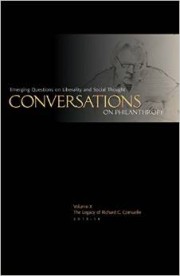Poverty and Politics in Tocqueville’s Memoir on Pauperism
Alexis de Tocqueville (1805-1859) is best remembered in the United States for Democracy in America, his penetrating study of life in the early nineteenth-century. Tocqueville was, of course, an analyst of his own France, and his The Old Regime and the Revolution remains a classic analysis of pre-Revolutionary and Revolutionary France. Less well-known, however, is that Tocqueville was also keenly interested in England, traveling to England several times and following with great interest the political and social developments there during his lifetime. One outgrowth of his interest in England’s politics was his Memoir on Pauperism, a short piece written following an 1833 visit to England and delivered to the Royal Academy in Cherbourg in 1835. This memoir, which was not included in the early editions of Tocqueville’s collected works and which was not even translated into English until 1968, captures England at a very specific moment, as her Elizabethan-era poor laws were undergoing major revision, via the Poor Law Amendment Act of 1834. Tocqueville’s analysis continues to speaks to us today, offering fresh insights into the moral hazards associated with welfare programs, and challenging us—as advocates of a free and beneficent society—to seek better alternatives to these problems in our own times. Tocqueville develops his thoughts about state-based aid programs by presenting a series of three paradoxes which give organizational shape to the Memoir.
Industrial Progress and the Expansion of Needs
He opens by commenting upon the first paradox: the strange fact that England is both the world’s wealthiest country and that with the most paupers, or persons receiving public assistance. In prosperous England—which Tocqueville dubs “the Eden of modern civilisation”1 —fully one sixth of the people were relying on public charity, whereas in poorer, less developed countries such as Spain and Portugal, the number was significantly lower. Probing how to understand the causes of this paradox, Tocqueville offers a lengthy, Rousseauian account of human history, tracing man’s movement from the State of Nature into society, the development and growth of “artificial inequalities” among men, the rise of feudalism, and the dawn of the Industrial Age. Most relevant for the investigation of pauperism is Tocqueville’s discussion of what happens near the end of the Middle Ages.
Tocqueville describes how wealthy landowners’ tastes for luxuries increases and grows more refined with the passage of time as well as how the laboring peasants see the landowners’ luxuries and begin to desire them. He notes, moreover, how luxuries become thought of as needs over time, and how the basic necessities produced by the land are eventually no longer sufficient to satisfy the ever-increasing “needs” of either group. In a pattern that expands each year, farm laborers quit the land, relocating to villages and cities to engage in the manufacture and trade of luxury (i.e., not necessary) items. Tocqueville sees this expansion of perceived needs as the “immutable” law governing civilization’s advance (22), and while he broadly sees this development as progress, he appreciates that it does not come without tradeoffs. Indeed, Tocqueville finds this very progress to be both the direct and indirect source of the increase of pauperism in modern England.
Most obviously, the laborer who abandons the land to become an industrial worker increases his exposure to fortune. Because the product of his labor is not necessary to life, demand for it is more variable, and if demand vanishes, the market he serves and which provides his means for survival vanish as well. This is one clear source of pauperism: displaced industrial workers whose products are no longer demanded and who, through lack of skills or simply scarcity of jobs, cannot find work in the production of whatever goods are in demand.2 Commenting on this danger, Tocqueville concludes, “The industrial class which gives so much impetus to the well-being of others is thus much more exposed to sudden and irremediable evils” (23).
Tocqueville next traces another, more subtle explanation for the increase of claims for public assistance that accompanies industrial progress. “Man is born with needs, and he creates needs for himself,” he writes. The latter class of “needs” is originally luxuries or pleasures, and as we have already seen in Tocqueville’s discussion of peasants’ flights to the city, over time, luxuries become habits, and finally, genuinely felt necessities. Because of this, “among very civilized peoples, the lack of a multitude of things causes poverty; in the savage state, poverty consists only in not finding something to eat” (24). With a nod to something like the idea of relative deprivation, Tocqueville notes that because of England’s comparative affluence, the number of things there its inhabitants consider to be needs is vastly greater than in less well-to-do countries. Two effects flow from this. On the one hand, the lack of a wide array of non-essentials instills in the have-not a sense of deprivation, thus leading greater numbers of individuals to make claims upon public assistance in order to secure these “necessities.” On the other hand, society shares the same notions of what constitutes deprivation and “believes itself bound to come to the aid of those who lack them, and cures evils which are not even recognized elsewhere” (25). The increase in England’s pauperism is attributable, then, to both of these causes, together with the increased exposure to fortune that accompanies rising industrialization and employment in luxury goods production.
In the modernity Tocqueville describes, an increase in the number of those turning to their fellow men for assistance seems inevitable. The question then becomes how best to cope with the consequent swelling in calls for assistance. Two options present themselves, the first being private charity, which “leads each individual, according to his means, to alleviate the evils he sees around him” (25). Tocqueville considers this form of charity natural, presumably a manifestation of human sympathy. There is also another form of charity, a modern form, which is “less instinctive, more reasoned, less emotional, and often more powerful,” and which “leads society to concern itself with the misfortunes of its members and is ready systematically to alleviate their sufferings” (25-26). In the context of relief to the poor, the second type of charity takes the form of state-sponsored public assistance programs, and Tocqueville is quick to note the appeal of such programs:
At first glance, there is no idea which seems more beautiful and grander than that of public charity. Society is continually examining itself, probing its wounds, and undertaking to cure them. At the same time it assures the rich the enjoyment of their wealth, society guarantees the poor against excessive misery. It asks some to give of their surplus in order to allow others the basic necessities. This is certainly a moving and elevating sight (26).
The appearance of progress and the appeal of public assistance schemes turn out, however, to be illusory, and just as the irony that the economic prosperity of advanced societies like England has increased the number of paupers is not lost on Tocqueville, so is he aware of another irony: the fact that the same economic prosperity and wealth that allows England to create so-called public charities, i.e., state-sponsored welfare programs, has transformed aid from a temporary measure to a permanent feature, thus also transforming the poor into a permanent and degraded underclass.
The Moral Hazard of Welfare Rights
This brings Tocqueville to the Memoir’s second paradox: that the right to public charity differs from other rights, in that while other rights elevate their possessor, the right to charity degrades its possessor. On the whole, Tocqueville is an admirer of rights, noting in Democracy in America that rights are second only to the principle of virtue, even going so far as to proclaim, “The idea of rights is nothing more than the idea of virtue introduced into the political world.”3 This praise is echoed in the Memoir, in which Tocqueville notes the presence of “something great and virile in the idea of rights,” asserting that “There is nothing which, generally speaking, elevates and sustains the human spirit more than the idea of rights” (31).
If the idea of rights is generally elevating for both individuals and society, the practice of a right to public assistance, however, is just the opposite, and Tocqueville turns to examine the “fatal consequences” of these programs. Although drawn from a time period and context far from our own, his analysis retains a remarkable freshness and prescience.
At the heart of Tocqueville’s critique of public charity are questions of unintended consequences and moral hazard. He begins by noting the effects of public charity on the work ethic, observing that the “right” to claim public assistance erodes the motive to work. Tocqueville believes that most people are only motivated to work from necessity and that very few work out of a desire to improve their own condition. Other than the need to work in order to survive, the average person, he argues, “has no interest in working, or if he works, has no interest in saving” (28). By expanding the right to financial assistance to all those who have need and creating a universal entitlement to aid that covers more than the most basic of necessities, public charities remove the necessity of working that is present when subsistence is on the line, thus destroying most individuals’ incentives to work as well as their incentive to save. Moreover, since the law does not and cannot differentiate between those who do work but might still require income supplements and those who choose not to work, it diminishes the motivation to try to support oneself and takes away any moral high ground to claim by working. The theory is straightforward: why work or save, when someone else will take care of your needs for you? Why work, when there is no moral, legal or pecuniary advantage to doing so?
Tocqueville claims that by disincentivizing the poor from working, public assistance laws also encourage idleness, which in turn breeds a host of vices, including criminality and moral turpitude. “What will come,” he asks rhetorically, “of a degraded idleness obtained by baseness, merited by misconduct, enjoyed in ignominy?” The Memoir offers evidence, drawn from Tocqueville’s attendance in English court during his 1833 visit, about erosion of morals and the rise of illegitimacy, idleness, and criminality due to the poor laws. In particular, he emphasizes that according to the laws, if paternity of a child is not proven, illegitimate children are supported at public expense and that an unwed mother’s subsidies increase with each child. This, he says, has “facilitated the misconduct of lower-class women as much as we could. Illegitimate pregnancy must almost always improve their material condition….So they thrive from their very vices” (42). Simultaneously, the laws de-stigmatize unwed motherhood and illegitimacy, thus contributing to a further erosion of morals about which Tocqueville is deeply concerned.
Ideally, says Tocqueville, the law would require claimants to perform public work in order to receive benefits, but he is aware of the logistical difficulties involved with implementing such a mandate. He particularly expresses concern that the number of “public workers” (i.e., paupers, working as a condition of benefit receipt) might not correspond to the number of public projects in any given area. In some places, there will be more paupers than projects, and thus the temptation to create make-work projects will arise, while in other places, the number of projects will exceed the number of potential workers. Normally, one could expect that workers would relocate to where demand was higher, but because benefits were paid by the localities under the existing poor laws, localities could forbid the poor from moving into their jurisdictions, thus limiting their movement.
While the coordination of public works projects and questions about freedom of movement could, perhaps, be obviated by making public assistance programs more national rather than local, another difficulty to which Tocqueville is alert would continue to exist and might become an even greater problem. This is the growth of a bureaucracy to “manage” and coordinate programs. Tocqueville’s scorn for such bureaucrats and administrators echoes his distaste for the poor who prefer to simply receive benefits rather than trying to work. He describes public assistance bureaucrats as “an idle and lazy class, living at the expense of the industrial and working class.” The resentment of the industrious for both the non-working, permanent recipients of public assistance and for those bureaucrats who earn a living by overseeing the transfer of wealth from the more industrious (or lucky) to the less so poses a significant threat to social bonds and social harmony.
The Social Benefits of Private Beneficence
Tocqueville seems especially concerned with the effects of “public alms” on social cohesion, and this brings him to his third and final paradox: that private charity, which appears weaker than public charity, is in fact both superior and more effective. His defense of private charity asserts that private charity is better for the individual recipient, the individual donor, and the country as a whole. Tocqueville notes that in asking for private charity, the poor man “recognizes…his condition of inferiority” in relation to his fellow citizens, but he views that inferiority as a temporary condition, and his admission of it is private, rather than public. Not only does the public admission of “inferiority” which is made in claiming public assistance demoralize the welfare claimant and thus further the demoralization Tocqueville had already described, but it also sows the seeds of class resentment on both sides. Because funding for public charities is compulsory (via taxation) and because individual “donors” have no connection to recipients, the wealthy individual resents the recipient of alms, whom he sees “only as a greedy stranger invited by the legislator to share his wealth” (31). By contrast, the poor man’s despair at his permanent poverty is coupled with growing envy for the wealthy. The social consequences of this situation are dire: “Far from uniting these two rival nations . . . into a single people, it breaks the only link which could be established between them” and “prepares them for combat” (31).
Having laid out what he sees as the evils of public charity, Tocqueville is left with the problem of finding a better solution. It is not that he sees no place for certain forms of public assistance. Indeed, the Memoir endorses permanent public assistance for certain types of people (the aged, the infirm, the ill, and the insane) and temporary public assistance during certain emergency situations, as well as publicly funded free schools for children of the poor. Moreover, Tocqueville seems to concede that the scope and character of modern industrial life makes relying only on private charity “imprudent,” and that therefore some public assistance programs are necessary.
But what should those programs be? By offering such a penetrating analysis of the problems associated with public welfare programs, Tocqueville seems to have painted himself into something of a corner when it comes to finding alternate arrangements, and although the Memoir itself ends with the promise of a sequel in which solutions would be offered, Tocqueville never produced that work. His notebooks reveal that he continued to struggle with the problem, considering different options at various times. Possible solutions included land reform to expand the group of self-reliant small landowners, and different options that would offer laborers the opportunity of owning shares in the firms in which they worked. Both of these plans aimed at decreasing individuals’ exposure to what Tocqueville saw as the highly variable fortunes of industrial life. Other possible solutions focused on voluntary associations, something Tocqueville believed to be an essential element of a free society, and he mulled over the possibility that voluntary associations could be formed that would target bringing an end to begging and vagrancy, as well as the notion that voluntary associations could perhaps organize something like cooperative savings banks, into which charitable donors could give money and into which the poor would be encouraged to contribute a portion of their wages, with the idea that members who found themselves in need could withdraw from the “bank,” rather than turning to public assistance. In the end, however, none of those solutions seems to have satisfied Tocqueville, and the Memoir remains an unfinished project, having diagnosed a problem but having offered no definitive solutions.
What, then, are we to make of the Memoir and of the lack of a sequel offering solutions? Should Tocqueville’s inability to find better options than the one whose flaws he brings so clearly to light be deemed a failure? While we will not find in the Memoir an overlooked blueprint that will solve today’s problems, we can nevertheless read it with benefit. Much as we continue to glean self-understanding from reading Tocqueville’s Democracy in America, reading his Memoir on Pauperism can help us understand the unintended consequences of apparently benign “solutions” and can help us become more fully aware of the difficulties of solving the problem of need in the modern world—much more the hazards of relying too much on solutions that are government-centered! The reader of the Memoir is left in anticipation of its undelivered second installment, but is also left with an invitation to explore new solutions to an old problem.
Endnotes
[1] Alexis de Tocqueville, Memoir on Pauperism, translated by Seymour Drescher (London: IEA Health and Welfare Unit, 1997), 17. All subsequent references are parenthetical in the text, with page numbers corresponding to this edition.
[2] In passing, I note that Tocqueville sounds more pessimistic about the prospects for retraining and reemploying displaced workers than most of what we hear today from politicians and economists on both sides of the aisle.
[3] Democracy in America, vol. I, edited by Eduardo Nolla and translated by James T. Schleifer (Indianapolis: Liberty Fund, 2009), 389.






